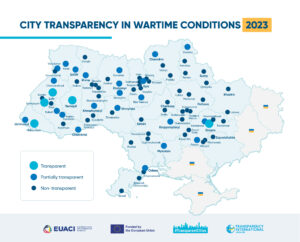
Today, Lviv Mayor Andriy Sadovyy took part in the broadcast
Детальніше
Business can receive compensation for the purchase of equipment and
ДетальнішеFitch Ratings has affirmed the Ukrainian City of Lviv’s Long-Term Foreign- and Local-Currency Issuer Default Ratings (IDRs) at ‘B-‘. The Outlooks are Stable. Fitch has also assigned the city a National Long-Term Rating of ‘AA-(ukr)’ with Stable Outlook.
“Lviv has been cooperating with the rating agency Fitch Ratings since 2017. Obtaining a city credit rating is one of the obligations under the contracts with the European Bank for Reconstruction and Development.
The city’s credit rating on the international scale remains unchanged – “B-“. This is considered a speculative indicator, but it is due, first of all, to the overall macroeconomic situation in the country. In each of its reports, Fitch Ratings notes that the city’s rating is limited by a sovereign rating, that is, a country’s rating.
In this year’s report, the agency also identified the so-called Standalone Credit Profile – a rating that would the city have, if not limited by the sovereign rating. It is rated at “BB-“, which is 3 points better than the sovereign rating.
Also, the city was assessed on a national scale at the level of “AA- (ukr)”. This is a rather good result and shows a positive situation if compared to organizations and institutions within Ukraine.
We value our cooperation with Fitch Ratings and hope for positive changes in state economic situation, which will contribute to improving the city’s ranking,” said Roman Staretskiy, Acting Head of Investment and Projects Office.
On June 14 2019 Fitch Ratings published their press release (Source):
“Fitch Ratings-Warsaw/London-14 June 2019: Fitch Ratings has affirmed the Ukrainian City of Lviv’s Long-Term Foreign- and Local-Currency Issuer Default Ratings (IDRs) at ‘B-‘. The Outlooks are Stable. Fitch has also assigned the city a National Long-Term Rating of ‘AA-(ukr)’ with Stable Outlook.
The affirmation reflects Fitch’s unchanged view that the city’s rating is constrained by the Ukraine sovereign rating (B-/Stable). Fitch also assesses the city’s Standalone Credit Profile (SCP) at ‘bb-‘, based on the combination of Lviv’s vulnerable risk profile and debt sustainability assessment at ‘aaa’.
The affirmation also reflects Fitch’s expectations that the city’s sound operating results will be maintained over the medium term, as well as sound debt metrics. This is despite the projected moderate growth of the city’s net adjusted debt following the implementation of an ambitious capex programme by its municipal companies, which is financed from debt incurred from international financial institutions and guaranteed by the city.
Lviv is the biggest city in the west part of Ukraine with a population of about 700,000. It is the capital of the seventh-largest region, which contributed 4.8% to Ukraine’s GDP in 2016 and 6% of the total population in 2017. Its economy is diversified across manufacturing and services. Although Lviv’s economy is well-positioned among domestic peers, it significantly lags international peers, with GRP per capita well below the EU average.
KEY RATING DRIVERS
Revenue Robustness Assessed as Weaker
The city’s revenue framework is unstable amid continuous shaping of tax and budgetary regulation. Lviv’s operating revenue is dominated by taxes, which are all collected by the national tax office, and represented over 50% in the last four years (57% in 2018). Transfers from the central government accounted for about 30% of the city’s revenue. The city’s operating margin has historically been sound, at over 20% in 2015-2018. However, the ongoing amendments to national fiscal regulations and the dependence on a weak counterparty for a material portion of the city’s revenue drive the Weaker assessment of the robustness of Lviv’s revenue framework.
Revenue Adjustability Assessed as Weaker
We assess Lviv’s ability to generate additional revenue in response to possible economic downturns as limited, similar to other Fitch-rated Ukrainian cities. Although the city has rate-setting power over a number of local taxes, which accounted for 21% of the city’s operating revenue in 2018, the real ability to generate additional revenue is limited. Any potential increase in local tax rates is constrained by both legally set ceilings and the relatively low income of the city’s residents.
Expenditure Sustainability Assessed as Weaker
The spending dynamic during the last five years has been influenced by high, albeit lowering, inflation and reallocation of spending responsibilities. Currently, the city’s main spending responsibilities are in education and healthcare, which are of a counter-cyclical nature. However, the city is only responsible for the maintenance of schools and healthcare institutions while the salaries of teachers and healthcare personnel are financed by transfers from the national budget. Due to the overall structural weakness of Ukraine a further transfer of some of these responsibilities to the municipal level is probable as has been the case with the recent transfer of certain social benefits. Therefore the city’s expenditure framework is characterised as fragile, leading to a Weaker assessment of its sustainability.
Expenditure Adjustability Assessed as Weaker
Fitch assesses the city’s ability to reduce spending in response to shrinking revenue as weak, similar to other Fitch-rated Ukrainian cities. This is evidenced by a material proportion of inflexible items in the city’s operating expenditure and overall low per capita spending compared with international peers. Although the city’s capital expenditure averaged 25% of total spending in 2015-2018, it does not provide the city with much expenditure flexibility in light of the city’s high overall infrastructure needs amid serious infrastructure underfinancing during a prolonged period of time.
Liabilities and Liquidity Robustness Assessed as Weaker
Ukraine’s framework for debt and liquidity management is weak. The national capital market is underdeveloped, while the unfavourable credit history of the sovereign, including Ukraine’s default in 2015, exerts further downward pressure. The 2015 sovereign default impaired Ukrainian local and regional governments’ (LRG) access to debt capital markets. This is why like many other national peers, Lviv did not borrow from the market and maintained a debt-free status in 2014-2017. Lviv resumed borrowing in 2018 following Ukraine’s return to the capital market. In June 2018, Lviv issued bonds of UAH440 million with three-year maturity. Ukraine’s key policy rate was reduced to 17.5% at end-April 2019 from 18% set on 1 December 2018.
The city’s administration supports investments in the city’s infrastructure through its municipal companies, which benefit from the advantageous loans and non-returnable grants from the international institutions like EBRD/EBI. The loans are taken by the municipal companies but guaranteed by the city. Fitch has included the guaranteed incurred debt of the municipal companies into “Other Fitch classified debt” and thus in Lviv’s adjusted debt as many of those companies have been posting losses in recent years and the city provides them with capital injections, including amounts equal to the guaranteed debt coming due in a particular year.
The total value of the guarantees issued by the city reached about UAH5 billion at the end-2018, but the actual debt withdrawn by the municipal companies was lower, at UAH1.2 billion (ie. 12% of the city’s operating revenue). Under Fitch’s rating case we expect the latter to rise to UAH2 billion in 2020 and UAH3 billion in 2023, but the actuals may deviate from those assumptions, depending on the pace of projects’ implementation.
Liabilities and Liquidity Flexibility Assessed as Weaker
Similar to other Ukrainian cities, Lviv’s available liquidity is restricted to the city’s own cash reserves. The city has no undrawn committed credit lines. Potential liquidity providers are local banks (‘b-‘ rated counterparties) justifying a Weak assessment for the liquidity profile. There are no emergency bail-out mechanisms from the national government in place due to the fragile capacity and hence weak public finance position of the sovereign, which is dependent on IMF funding for the smooth repayment of its external debt.
Debt Sustainability Assessment: ‘aaa’
Under Fitch’s rating case the city’s debt payback ratio (net adjusted risk-to-operating balance) – the primary metric of the debt sustainability assessment – will remain sound and far below five years over the rating horizon, which justifies the city’s debt sustainability assessment of ‘aaa’. The secondary metric – fiscal debt burden (net adjusted risk to operating revenue) – also supports strong debt sustainability assessment, as well as the actual debt service coverage ratio (ADSCR, operating balance/debt service, including short-term debt maturities).
According to Fitch’s rating case, the payback ratio will remain strong over the projected period, gradually rising to about 3.8x in 2023 from about 0.7x in 2018. The fiscal debt burden will gradually increase to about 50% in 2023 from 15% in 2018 following the implementation of an ambitious capex programme by the city’s municipal companies. The ADSCR, which is currently very strong, may weaken in years of expected debt repayment (planned bond redemption of PLN440 million in 2020), but should remain sound, above 2x under Fitch’s rating case scenario.
RATING DERIVATION
The city’s IDRs are capped by the Ukrainian sovereign IDRs. Lviv’s SCP is assessed at ‘bb-‘, which reflects a combination of a ‘Vulnerable’ risk profile and the debt sustainability assessment of ‘aaa’. The SCP also factors in national peer comparison. The IDRs are not affected by any asymmetric risk or extraordinary support from the central government.
KEY ASSUMPTIONS
Fitch’s key assumptions within our rating case for 2019-2023 include:
– Nominal growth of operating revenue close to expected inflation, with income tax and single tax revenue rising well above inflation and compensating the projected decline of current transfers from the state budget;
– Nominal growth of operating expenditure by about 2pp. above inflation;
– Capex exceeding 20% of the city’s total expenditure, in line with the four-year historical average.
RATING SENSITIVITIES
Lviv’s IDRs are currently constrained by the sovereign ratings, while the city’s SCP is assessed at ‘bb-‘. Therefore any rating action on the sovereign will be mirrored in the city’s IDRs.
The SCP could be also positively affected by the sovereign upgrade provided the maintenance of the strong debt sustainability metrics. The city’s SCP could be downgraded if the payback deteriorates above five years.”

Today, Lviv Mayor Andriy Sadovyy took part in the broadcast
Детальніше
Business can receive compensation for the purchase of equipment and
Детальніше